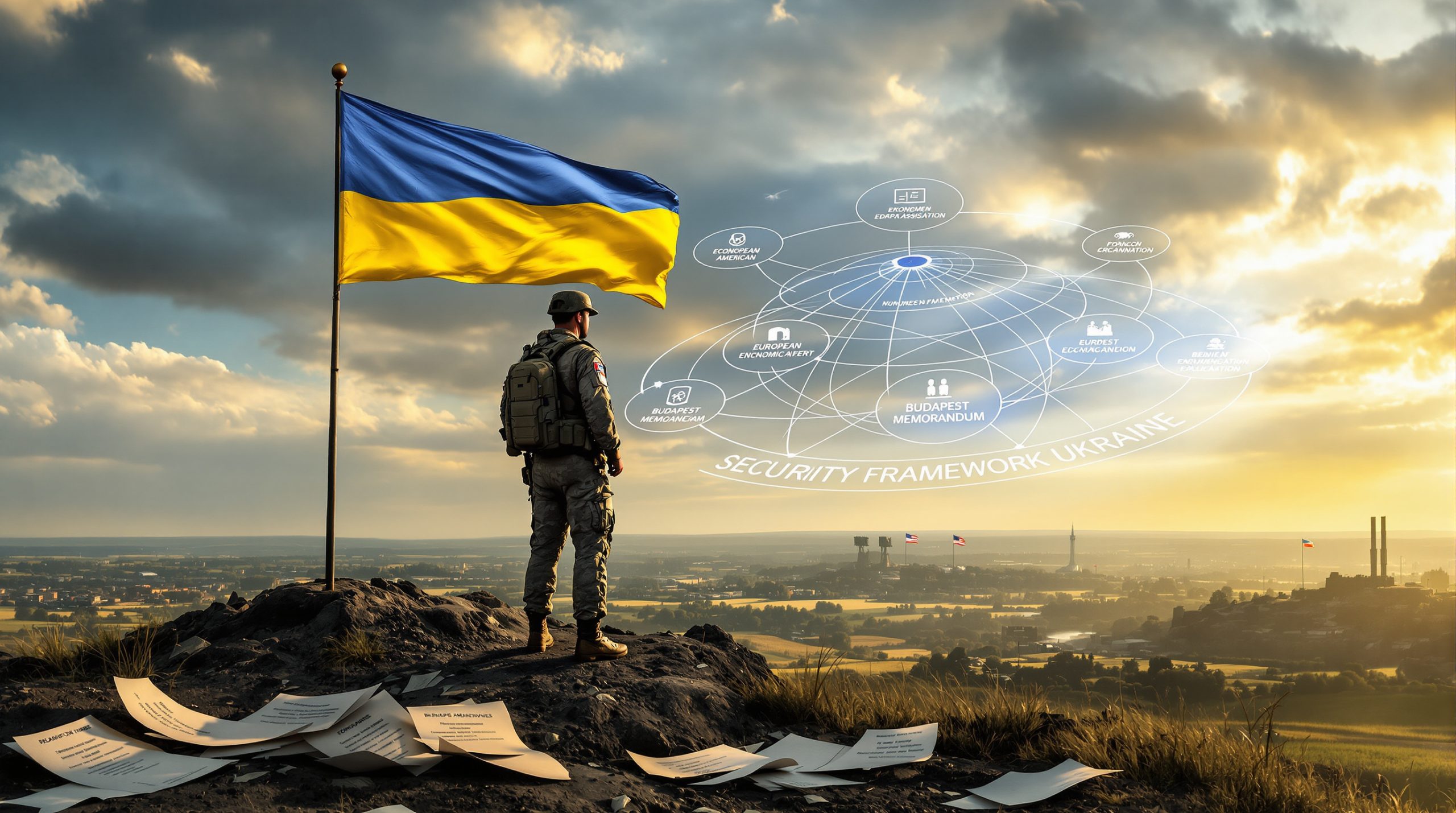Ukraine's Path to Security Guarantees: Building a New Framework
Ukraine is developing a comprehensive security framework to replace failed past agreements like the Budapest Memorandum. This initiative represents a fundamental shift in approach, focusing on concrete military commitments rather than diplomatic assurances that proved ineffective when Russia annexed Crimea in 2014 and launched its full-scale invasion in 2022.
The new security guarantees aim to establish enforceable mechanisms with specific military components that would create genuine deterrence against future aggression. Ukrainian officials are actively coordinating with Western allies to design a framework that provides meaningful protection while acknowledging the shifting dynamics of transatlantic security cooperation.
What Are Ukraine's New Security Guarantees?
Defining a New Security Framework
Ukraine's emerging security framework marks a deliberate departure from previous arrangements that failed to protect its territorial integrity. Unlike the Budapest Memorandum, which relied primarily on diplomatic assurances, the new guarantees focus on practical military capabilities, response protocols, and deterrence mechanisms.
"Our teams, above all the military, have already begun active work on the military component of security guarantees," announced Andriy Yermak, Ukrainian President Volodymyr Zelenskyy's chief of staff, in a social media post on August 20, 2025. This statement underscores Ukraine's commitment to developing guarantees with substantial defensive capabilities rather than paper promises.
The framework is being developed through coordinated meetings between Ukrainian officials and national security advisers from Western countries and NATO, indicating a multilateral approach to security planning that incorporates diverse expertise and capabilities.
Learning from Past Failures
The Budapest Memorandum of 1994, which saw Ukraine surrender the world's third-largest nuclear arsenal in exchange for security assurances, stands as a cautionary tale in Ukrainian security planning. When Russia annexed Crimea in 2014 and later launched its full-scale invasion in 2022, the Memorandum's signatories proved unable or unwilling to enforce its provisions.
Yermak explicitly warned against repeating the "mistake of 'Budapest'" in his communications about the new security framework. This historical lesson has fundamentally shaped Ukraine's approach, driving a focus on concrete capabilities rather than diplomatic language that lacks enforcement mechanisms.
The failure of previous security arrangements has created a determination among Ukrainian leadership to develop guarantees that would make aggression prohibitively costly through practical defensive capabilities and clear response protocols from international partners.
How Is Ukraine Developing Its Security Strategy?
Active Military Planning
Ukraine has implemented a methodical approach to developing its security strategy, with military teams leading the technical planning process. These efforts include detailed assessment of defensive requirements, potential threat scenarios, and necessary response capabilities to create effective deterrence.
Coordination with Western security advisors provides critical expertise and resource planning, ensuring that Ukraine's security framework integrates effectively with partner capabilities. This collaboration focuses on practical defensive capabilities that would make aggression prohibitively costly while remaining consistent with international norms.
Yermak confirmed that work is being conducted through meetings of national security advisers from Western countries and NATO, demonstrating the international dimensions of Ukraine's security planning and the importance of multilateral coordination.
Contingency Preparations
While pursuing diplomatic solutions, Ukraine is simultaneously developing contingency plans "in case the Russian side continues to prolong the war and disrupt agreements on bilateral and trilateral formats of leaders' meetings," according to Yermak's statement reported by RFE/RL on August 21, 2025.
This two-track approach reflects Ukraine's pragmatic recognition that security planning cannot depend on Russian cooperation. By developing both diplomatic and contingency frameworks simultaneously, Ukraine maintains flexibility to respond to changing circumstances while continuing to pursue peaceful resolution.
"Ukraine is ready for any format of dialogue on a fair end to the war," Yermak stated, highlighting the balance between pursuing diplomatic solutions while preparing for continued challenges. Furthermore, recent Ukrainian tax updates indicate the country is also strengthening its economic foundations to support long-term security planning.
What Role Will the United States Play in Ukraine's Security?
Supporting Rather Than Leading
The United States position on Ukraine's security guarantees reflects a significant evolution in transatlantic security relationships. US Vice President JD Vance articulated this stance clearly in a Fox News interview, stating: "I don't think we should carry the burden here. I think that we should be helpful if it's necessary to stop the war and to stop the killing. But I think that we should expect, and the president certainly expects, Europe to play the leading role here."
This position represents a fundamental shift from traditional post-Cold War security arrangements, placing greater responsibility on European nations to address regional security challenges. Vance emphasized this point, noting that "No matter what form this takes, the Europeans are going to have to take the lion's share of the burden."
The approach signals a rebalancing of security responsibilities within NATO and among European allies, with the United States moving toward a supporting rather than leading role in regional security frameworks outside of formal alliance structures.
Potential Air Support
While limiting direct ground involvement, US President Donald Trump has indicated America might provide air support as part of Ukraine's security framework. "We're willing to help them with things, especially, probably…by air," Trump stated according to the August 21, 2025 RFE/RL report, suggesting American aerial capabilities could complement European security contributions.
This approach would leverage America's substantial air power advantages while maintaining limitations on ground force commitments. Trump added, "We'll give them very good protection," indicating that while the United States seeks to limit its direct involvement, it remains committed to contributing meaningful capabilities to Ukraine's security framework.
The focus on air support reflects both America's military strengths and its political considerations, potentially offering substantial defensive capabilities while managing domestic concerns about troop deployments and escalation risks. This stance aligns with Trump's critical minerals order and broader US mineral security order which emphasize strategic resource independence and national security.
How Are European Nations Responding to Security Guarantee Discussions?
"Coalition of the Willing" Concept
European nations are exploring flexible security arrangements outside formal NATO structures through a proposed "Coalition of the Willing" framework. President Trump referenced this concept, noting that European countries "are willing to put people on the ground" with France and Britain considering troop deployments under this coalition model.
This approach allows European nations to contribute according to their capabilities and political will without requiring unanimous NATO consensus. The coalition concept provides a pragmatic mechanism for European security engagement that accommodates varying national positions while still delivering meaningful collective capabilities.
The "Coalition of the Willing" represents an adaptive approach to European security cooperation that could establish precedents for future regional security challenges beyond the immediate Ukraine situation.
Burden-Sharing Expectations
The emerging security framework places unprecedented responsibility on European nations to lead regional security efforts. This shift marks a potential turning point in European defense policy, with continental powers being expected to develop more independent security capabilities and leadership roles.
For decades, European security has relied heavily on American leadership and capabilities. The current discussions signal a significant evolution toward greater European security autonomy, with potential long-term implications for defense spending, military capabilities, and strategic decision-making across the continent.
This rebalancing of transatlantic security relationships could accelerate European defense integration while creating new imperatives for capability development among key European powers like France, Germany, and the United Kingdom. In parallel, the US Senate uranium ban highlights how resource security is becoming increasingly intertwined with military security frameworks.
What Challenges Remain in Establishing Effective Guarantees?
Russian Territorial Demands
Despite diplomatic efforts to find common ground, Russian President Vladimir Putin has shown no indication of backing down from territorial demands, including claims to land not currently under Russian military control. This fundamental position creates a substantial obstacle to developing security guarantees acceptable to all parties.
Russia's territorial ambitions extend beyond currently occupied areas, complicating any potential settlement that would form the basis for long-term security arrangements. This maximalist position creates significant challenges for negotiators seeking to establish stability while respecting Ukraine's sovereignty and territorial integrity.
The gap between Russian demands and Ukrainian sovereignty requirements represents perhaps the most fundamental challenge to establishing effective security guarantees, as it creates uncertainty about what territory would be covered by any protection framework.
Implementation Mechanisms
Developing practical implementation mechanisms remains a critical challenge for Ukraine's security planners. Any effective guarantee framework must specify exactly how, when, and under what circumstances military support would be activated, what forces would be involved, and what command structures would coordinate responses.
These technical details require extensive coordination between multiple nations with different military capabilities, command structures, and political constraints. Establishing clear response thresholds, communication protocols, and decision-making authorities across multiple sovereign states presents complex diplomatic and military planning challenges.
Without clearly defined implementation mechanisms, even the strongest diplomatic commitments risk becoming ineffective when tested. Ukraine's security planners must develop specific protocols that transform general commitments into actionable response capabilities with minimal political friction during crisis situations.
How Do Security Guarantees Fit Into Broader Peace Efforts?
High-Level Diplomatic Engagement
Security guarantees have become a central component of high-level diplomatic efforts to resolve the conflict. President Trump hosted Ukrainian President Zelenskyy and several European leaders at the White House on August 18, 2025, following Trump's summit with Russian President Putin in Alaska the previous week, according to RFE/RL reporting.
These sequential meetings highlight the interconnected nature of security guarantees and broader peace negotiations. The White House identified security guarantees as "a main topic of discussion" during the August 18 meeting, demonstrating their importance to any potential settlement.
This diplomatic sequencing illustrates how security guarantees function as both a technical military planning process and a critical diplomatic component of peace negotiations, requiring coordination across multiple diplomatic and defense channels simultaneously.
Balancing Deterrence and Diplomacy
Ukraine faces the challenge of developing security guarantees robust enough to deter aggression while not undermining diplomatic efforts to end the current conflict. This delicate balance requires careful coordination between military planning and diplomatic initiatives to ensure security preparations support rather than hinder peace prospects.
Too weak a security framework risks failing to provide meaningful protection, while too aggressive a posture might be perceived as escalatory. Finding this balance requires sophisticated diplomatic engagement that acknowledges legitimate security concerns while creating space for de-escalation and eventual normalization.
Ukrainian officials have emphasized their readiness for dialogue while simultaneously preparing security contingencies, reflecting this dual-track approach. Yermak's statement that "Ukraine is ready for any format of dialogue on a fair end to the war" demonstrates this balanced approach to pursuing both security and peace simultaneously.
What Would Effective Security Guarantees Include?
Military Assistance Provisions
Effective guarantees would likely include specific provisions for military assistance that transform diplomatic commitments into practical capabilities. These could include pre-positioned equipment, training programs, intelligence sharing, rapid response forces, and integrated air defense systems that could be quickly activated if needed.
Modern security guarantees increasingly focus on interoperability between partner forces, shared early warning systems, and coordinated response planning. These practical measures ensure that political commitments can be rapidly translated into military effectiveness during crisis situations.
The technical details of these provisions require extensive planning and coordination between military professionals across multiple nations. Ukraine's active military planning process, as confirmed by Yermak, focuses on developing these specific capabilities rather than general diplomatic language.
Economic and Technological Components
Comprehensive security guarantees extend beyond purely military dimensions to include economic resilience and technological security. Modern security frameworks increasingly recognize that economic vulnerability and technological dependence create strategic weaknesses that cannot be addressed through military means alone.
Effective guarantees might include investment in critical infrastructure protection, cyber defense capabilities, secure communications networks, and industrial capacity to sustain long-term defense efforts. These non-military components strengthen Ukraine's overall resilience against hybrid threats that combine conventional military pressure with economic coercion and information operations.
By developing multi-dimensional security guarantees, Ukraine can address the full spectrum of modern security challenges rather than focusing exclusively on conventional military threats. This comprehensive approach acknowledges the complex nature of contemporary security challenges that blur traditional boundaries between military, economic, and energy security transition domains.
FAQs About Ukraine's Security Guarantees
Why Are New Security Guarantees Necessary?
New guarantees are necessary because previous security arrangements, particularly the Budapest Memorandum of 1994, proved ineffective when tested by Russian aggression. The Memorandum's failure during Russia's 2014 annexation of Crimea and 2022 full-scale invasion demonstrated the inadequacy of diplomatic assurances without concrete implementation mechanisms.
Ukraine's experience has shown that security guarantees must include specific military components, clear response protocols, and practical deterrence capabilities rather than diplomatic language alone. Yermak's warning against repeating the "mistake of 'Budapest'" reflects this hard-learned lesson in international security arrangements.
New security guarantees aim to establish mechanisms that would make aggression prohibitively costly through practical defensive capabilities and clear international responses, creating genuine deterrence rather than paper promises.
Will Security Guarantees Require NATO Membership?
Current discussions focus on security guarantees outside formal NATO structures, potentially through bilateral agreements and the proposed "Coalition of the Willing." This approach allows for significant security cooperation without requiring the unanimous consent needed for NATO membership, which remains politically complex.
The "Coalition of the Willing" concept referenced by President Trump provides a flexible framework for European nations to contribute according to their capabilities and political will. This approach accommodates varying national positions while still delivering meaningful collective capabilities without the formal alliance commitments of NATO membership.
While NATO membership remains a long-term aspiration for Ukraine, the immediate security framework being developed provides practical protection without requiring the consensus decisions that have complicated Ukraine's NATO prospects.
How Might These Guarantees Affect Regional Stability?
Properly designed security guarantees could enhance regional stability by creating clear deterrents against aggression while establishing predictable security parameters. Effective deterrence reduces uncertainty and miscalculation risks by establishing clear consequences for potential aggression.
However, guarantees must be carefully calibrated to provide genuine security without being perceived as provocative or escalatory. This balance requires sophisticated diplomatic engagement that acknowledges legitimate security concerns while creating credible deterrence against further aggression.
The focus on defensive capabilities rather than offensive systems helps maintain this balance, demonstrating that security guarantees aim to prevent future conflict rather than enable military adventurism or territorial expansion.
What Timeline Exists for Implementing Security Guarantees?
While specific timelines haven't been publicly established, Ukrainian officials have indicated that work is actively underway. Yermak's August 20 announcement that military teams "have already begun active work on the military component of security guarantees" confirms this process is moving forward, though complete implementation will likely occur in phases.
Initial stages focus on planning and coordination between Ukrainian and Western security advisors, followed by capability development and formalization of security arrangements. This phased approach allows for adjustment based on diplomatic developments while building practical security capabilities in parallel with peace efforts.
The immediate focus on military planning while diplomatic negotiations continue demonstrates Ukraine's pragmatic approach to security development that doesn't delay practical preparations while pursuing diplomatic solutions.
Further Exploration
Readers interested in learning more about Ukraine's security situation can explore additional perspectives from Radio Free Europe/Radio Liberty, which offers ongoing coverage of Eastern European security developments and diplomatic initiatives related to the conflict.
Understanding the evolution of European security arrangements provides important context for current developments. The shift toward greater European responsibility for regional security represents a significant transformation in transatlantic relations with implications extending far beyond Ukraine.
The development of Ukraine's security guarantees represents an important case study in how nations adapt security frameworks to address contemporary challenges when traditional structures prove inadequate. The lessons from this process will likely influence security planning across Europe and beyond for years to come.
Ready to Detect the Next Major Mineral Discovery?
Discover why ASX mineral discoveries can generate substantial returns by exploring Discovery Alert's dedicated discoveries page, where the proprietary Discovery IQ model provides real-time alerts on significant mineral announcements, turning complex data into actionable investment opportunities.




